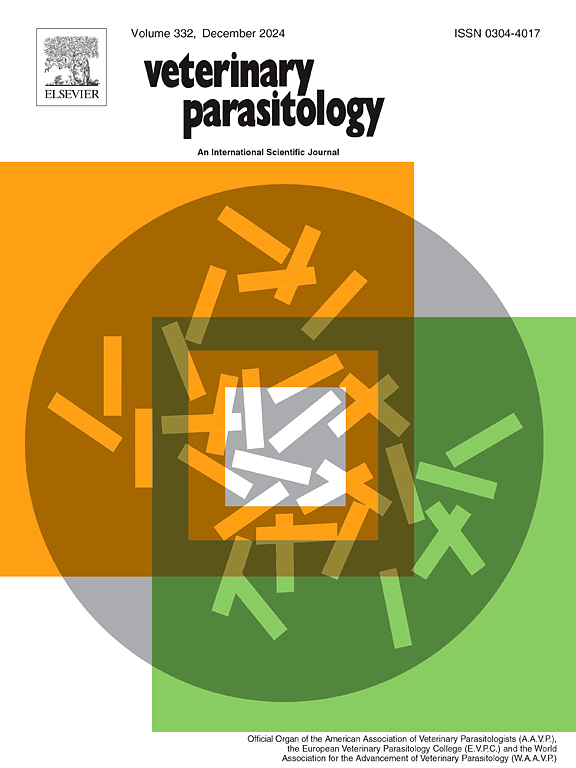助原抗原检测在筛查人群中的应用
IF 2
2区 农林科学
Q2 PARASITOLOGY
引用次数: 0
摘要
检测肠道寄生虫对兽医评估寄生虫感染风险至关重要。传统上,肠道寄生虫的检测主要依靠粪便浮选法检测卵子。本研究的目的是评估市购的粪原抗原免疫分析法检测蛔虫、钩虫、鞭虫、犬双螺旋虫、贾第鞭毛虫和囊异孢子虫在狗和猫胃肠道寄生虫感染中的临床应用价值。本研究评估了粪原抗原和离心粪浮选的检测阳性,以及粪浮选结果与粪原抗原结果相比导致临床管理改变的频率。从2024年3月6日至2024年6月6日,向商业参考实验室(IDEXX Laboratories)提交的898,299份样本的结果,以及粪原抗原免疫测定和离心粪便浮选(O&;P)的配对结果用于分析。83.7 %的样品coproantigen和O&;P均为阴性。6.1 %两种方法均为阳性,并将导致相同的治疗。另有9.4% %的样本的前抗原结果呈阳性,表明需要治疗,但O&;P未检测到寄生虫。最后,当排除有粪噬证据的样本时,只有0.6 %的样本有阳性的O&;P结果,但所有的粪原抗原都是阴性的。Coproantigen在识别需要抗寄生虫管理的狗和猫方面比O&;P更有效。本研究结果支持使用粪原抗原免疫测定法作为一种高度准确和有效的肠道寄生虫筛查方法。本文章由计算机程序翻译,如有差异,请以英文原文为准。
The utility of coproantigen testing in screening populations
Detection of intestinal parasites is essential for veterinarians to assess risk of parasite infections. Traditionally, detection of intestinal parasites has relied primarily on detection of ova with fecal flotation methods. The purpose of this study was to evaluate the clinical utility of a commercially available coproantigen immunoassay detecting roundworms, hookworms, whipworms, Dipylidium caninum, Giardia and Cystoisospora spp. for detecting GI parasite infections in dogs and cats. The study evaluated test positivity of coproantigen and centrifugal fecal flotation and how often fecal flotation results would lead to clinical management changes compared to the result on coproantigen.
Results for 898,299 samples submitted to a commercial reference laboratory (IDEXX Laboratories) over the three-month period from March 6, 2024, through June 6, 2024, with paired results for coproantigen immunoassay and centrifugal fecal flotation (O&P) were used for analysis. 83.7 % of samples were negative by both coproantigen and O&P. 6.1 % were positive on both methods and would result in the same treatment indicated. An additional 9.4 % of samples had a positive coproantigen result indicating a need for treatment but had no parasite detected by O&P. Finally, when samples with evidence of coprophagy are excluded, only 0.6 % of samples had a positive O&P result but were negative for all coproantigens. Coproantigen was more effective at identifying dogs and cats where antiparasitic management was needed than O&P. The results of this study support the use of coproantigen immunoassay testing as a highly accurate and effective screening method for intestinal parasitism.
求助全文
通过发布文献求助,成功后即可免费获取论文全文。
去求助
来源期刊

Veterinary parasitology
农林科学-寄生虫学
CiteScore
5.30
自引率
7.70%
发文量
126
审稿时长
36 days
期刊介绍:
The journal Veterinary Parasitology has an open access mirror journal,Veterinary Parasitology: X, sharing the same aims and scope, editorial team, submission system and rigorous peer review.
This journal is concerned with those aspects of helminthology, protozoology and entomology which are of interest to animal health investigators, veterinary practitioners and others with a special interest in parasitology. Papers of the highest quality dealing with all aspects of disease prevention, pathology, treatment, epidemiology, and control of parasites in all domesticated animals, fall within the scope of the journal. Papers of geographically limited (local) interest which are not of interest to an international audience will not be accepted. Authors who submit papers based on local data will need to indicate why their paper is relevant to a broader readership.
Parasitological studies on laboratory animals fall within the scope of the journal only if they provide a reasonably close model of a disease of domestic animals. Additionally the journal will consider papers relating to wildlife species where they may act as disease reservoirs to domestic animals, or as a zoonotic reservoir. Case studies considered to be unique or of specific interest to the journal, will also be considered on occasions at the Editors'' discretion. Papers dealing exclusively with the taxonomy of parasites do not fall within the scope of the journal.
 求助内容:
求助内容: 应助结果提醒方式:
应助结果提醒方式:


